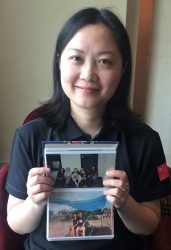Raleigh International’s long-term effect on in-country volunteers
Raleigh International’s (‘Raleigh’) mission is to create lasting change through youth. The organisational vision is of a world where the global community works together to build a sustainable future.
Raleigh’s Expedition programme, which has been running for 30 years, is one of two major volunteering programmes designed to create lasting positive change in rural communities through the structured activities and actions of youth volunteers and their influence on local communities.
The work brings together a diverse group of volunteers aged 17 to 25 from various cultural and socio-economic backgrounds around the world. They work together as a team for 10 weeks delivering projects in developing countries, focusing on environmental, community and leadership themes.
The study

Cathy Wu shared her memories of taking part in Raleigh International’s Expedition programme.
NEF Consulting’s pilot study collects together evidence of the benefits of volunteering by evaluating Raleigh International’s Expeditions programme through both a quantitative and a social Cost-Benefit (SCBA) analysis.
As a sustainable development charity that enables young people from around the world to create lasting change though volunteering, Raleigh International has a global community of alumni whose experiences form the basis of this evaluation. The ultimate goal is to create a valuable addition to the sparse body of evidence that explores the long-term socioeconomic and personal impacts of in-country volunteering in developing countries.
“I learned to negotiate, or try to persuade people, that was a very good thing for my work in the future,” (Cathy, Shanghai)
The assessment is based on indepth life history interviews with in-country alumni, the development of a Theory of Change (ToC), and analysis conducted through a SCBA.
In order to reach a shared understanding of the programme’s objectives, NEF Consulting first held a half-day ToC workshop in the UK with a selection of Expedition programme staff and Raleigh steering group members. To develop the narrative further, NEF Consulting next held in-depth, life-stage, qualitative interviews with 24 Namibian and Chinese in-country alumni on location in these countries, so as to develop a full understanding of their experiences.
“…with Raleigh you really got to see your country and the beauty of your country and I think that is really, really important for Namibian young people; to know that they have such a beautiful country.” (Raymond, Windhoek)
Once outcomes were identified, a Theory of Change diagram was developed. The outcomes were identified as occurring either during and immediately after the Expedition, or else as long-term impacts.
Outcomes
- Increased knowledge and appreciation of own country among Namibian volunteers
- Chinese volunteers highlighted improved teamwork, as they recognised much of what they achieved couldn’t have been done alone
- Increased interest in volunteering and civil engagement was found to be a significant outcome for both groups of in-country alumni
Improved leadership skills was found to be significant for many Namibian and Chinese in-country alumni. Interviewees reported a greater openness when listening to others: taking on a wide breadth of opinions before making a decision for a group; communicating effectively with team members; not jumping to conclusions but appreciating other’s skills and knowledge.
It is clear from the findings that Raleigh’s Expedition programme has touched the lives of in-country alumni on a personal level in a huge breadth of ways. But such experiences are not common to all volunteers, so to give more insight into the personal impact of the Expedition programme case studies from Chinese and Namibian volunteer alumni are included in the report.
Click here to read the full report.